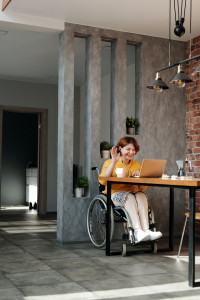Looking after our team in lockdown, and beyond
Mar 21
When we started brightfive, we wanted, first and foremost, to create a great place to work. We understood that this meant building a business that supports a healthy work/life balance.
It is more important than ever to ensure we are practicing what we preach. As we continue to navigate life in the pandemic, everyone is shouldering new and renewed burdens. There are mental and emotional loads to bear - the numbers of people seeking treatment for mental ill health has increased sharply since March 2020 (see our blog for practical tips on how to look after your mental health in lockdown). There are also increased practical responsibilities for many. With medically vulnerable people shielding and children home from school, employees have had to balance their existing responsibilities with meeting the increased care needs of family, friends and communities.
So how can we help our people during this difficult time? What does ‘looking after our team’ look like in practise?

What flexibility is - and what it isn’t
We take a flexible approach to work. We don’t expect work to come first for our team (that should be reserved for family, friends and health) and so we’ve always been open to our team members taking extra time off, working from home, or moving working hours when needed.
In recent years we have made this policy. All of our employees now have the right to flexible hours and to work from home up to 2 days a week. Although these were already established practices for some, we found that making it official (i.e. writing this into contracts) saw an immediate increase in uptake.
However, flexibility is about more than just the option to work from home or take flexitime. It’s also about the culture of the office and the messages that management give the team - explicitly and implicitly.
Offering ‘flexibility’ within a culture that does not value it, can feel like a trap for employees. The offer of flexibility is meaningless if a company is simultaneously encouraging unsustainable work practices. In companies with a workaholic culture, employees who choose to use their flexitime (or even just to go home on time!) may find themselves given less acknowledgement and fewer opportunities than their more desk-bound peers. Even the threat of an employee needing more flexibility can be justification enough for some employers to penalise individuals - an estimated 54,000 women lose their jobs every year simply for getting pregnant, according to Pregnant Then Screwed.
If employers are serious about looking after their people, they need to create a culture which truly values their health and wellbeing. Which does not assume the best and most loyal workers are the ones who clock the most hours at their desks. Which values sustainable, long term performance over performative workaholism.
So, we try to back up the policy with action. If we see someone is regularly working late we don’t say ‘well done’, but ‘what’s wrong?’. Of course, there are specific occasions when overtime is necessary, but if someone is regularly working beyond their contractual hours, this should be interpreted as a sign that either their workload is too great, or that they are struggling. This should be cause for concern, not celebration.
How does lockdown affect this?
‘Flexible working’ has taken on a new meaning in lockdown. Being able to start work a little later is not enough for many people. The frequent, sudden changes to people’s circumstances as we move through different Covid restrictions mean that one size cannot fit all. We have to take a much more flexible approach to flexibility.
Setting realistic expectations
Whilst we can’t give everyone a year off, it is also unreasonable to expect our people to be unaffected by all this upheaval. Checking in regularly with staff to understand their current health, wellbeing and workload is especially important while we work remotely. So is being ready to offer additional support and be open to flexible solutions where needed.
A personalised approach
Everyone's circumstances and pressures are different. We have a company approach, but it is personalised to each individual.
Inviting employees to be open and honest about their circumstances allows the opportunity to work with them to find the best solution to balance their responsibilities. Perhaps an employee needs to reduce their hours or work in the evenings until schools reopen. Being open to this sort of compromise is likely to see better outcomes for both parties, as opposed to insisting that employees work ‘as usual’ in circumstances which are anything but.

It’s not just for parents
We believe everyone deserves a healthy work/life balance and can benefit from flexible working, not just those raising children. It is also important to remember that just because someone isn’t homeschooling, it doesn’t mean they’re unaffected by lockdown or the pandemic in general.
While we’re (rightly) worrying for those juggling the roles of parent, teacher and employee all at once, it could be easy to forget the less visible strains on those without kids, or to see those struggles as less important. Parents and child-free people alike may be dealing with a myriad of concerns right now such as financial worries, physical or mental health problems, loneliness or adult caring responsibilities. It’s key to factor this in and be supportive of all employees. It's also important not to automatically assume your child-free employees can or should pick up the slack for parents.
Providing information and reassurance
Everyone is living with a great uncertainty at the moment, this can be uncomfortable to say the least. We’re doing our best to minimise the uncertainty our people feel concerning work in two ways.
First, we provide regular company updates to the whole team, letting them know the current health of the business, what projects are in the pipeline and any changes we have planned. These were especially important in the early, chaotic days of the first lockdown to reassure our people that we weren’t about to close the business and that we had plans and provisions in the place. Keeping everyone in the loop helps build trust. Our team knows that we will tell them the truth and that they will never be blindsided by big news out of the blue.
Second, we have been swift in our response to changes such as lockdowns and school closures. At each significant point of change, we’ve aimed to send out timely communications to our team and made time and space to listen to individual concerns in relation to this change. We let them know that we understand that there will likely be an impact on their work and that we are here to support them however we can.
What can we learn?
There is a risk of sounding trite or insensitive when we talk about what lessons we can learn from the pandemic. But it’s human nature to look for something positive to be gleaned from times of hardship. We need to look for opportunities to make the world a little bit better in the future, without minimising the very real suffering and loss around us.
The challenge to businesses now is to learn how to become a genuinely supportive employer - to become more flexible, compassionate and to nurture employee wellbeing. Not every business is taking this opportunity to learn. We have all heard stories of employers still expecting 60 hour weeks, or refusing reasonable requests for furlough from employees struggling to manage all the competing demands currently placed upon them.

What’s at risk?
Burnout is costly. Pre-pandemic research estimated that work-related stress and mental ill health costs British businesses £26 billion per annum. Imagine how these figures will have been impacted by Covid-19. An inflexible approach has significant risks and is clearly a poor investment in the mid-long term.
What we can gain
The opportunity is great. Flexible work arrangements (and here is a useful list of examples of all the things this can mean) have been shown to bring a multitude or direct and indirect benefits to employers, including: cost savings (e.g. office space); increased employee satisfaction, wellbeing and productivity; increased access to work to those living with disability or chronic illness; reduced absenteeism and turnover; and attracting new recruits.
Flexible work arrangements are also key to closing the gender pay gap. Women still do the significant majority of unpaid care work in the UK. Introducing flexible working for all genders can make this less of an obstacle. Flexible work options empower more women to join the workforce, move up in seniority and take on higher paid roles. It also enables more men to take on more active caring roles outside of work, as TimeWise reports:
“Almost as many men as women want to work flexibly, and over half of younger fathers have said they would take a pay cut to work less and spend more time with their family. But fathers are twice as likely as mothers to report the fear that working flexibly will have a negative impact on their career. And if they do ask to work flexibly, their requests are turned down at almost twice the rate that mothers’ are.”
If you (or your employer) needed any more convincing, take a look MotherPukka’s guide to ‘swatting resistance’ to flexible working. While you’re at it, take a look around all of MotherPukka’s very helpful Flex Appeal campaign content.
What the pandemic has made clear is that supporting employee wellbeing is crucial. It has also shown that paying lip service to flexibility is not enough - it is perfectly possible to work from home, or on adjusted hours, and feel more stressed than ever.
What people really want and need is the support to find a genuine work/life balance, suited to their individual circumstances. This needs to be backed up by policy, two-way communication, and, crucially, by company culture. This is how we can begin to build healthier, happier, more equitable workplaces to the benefit of us all.
